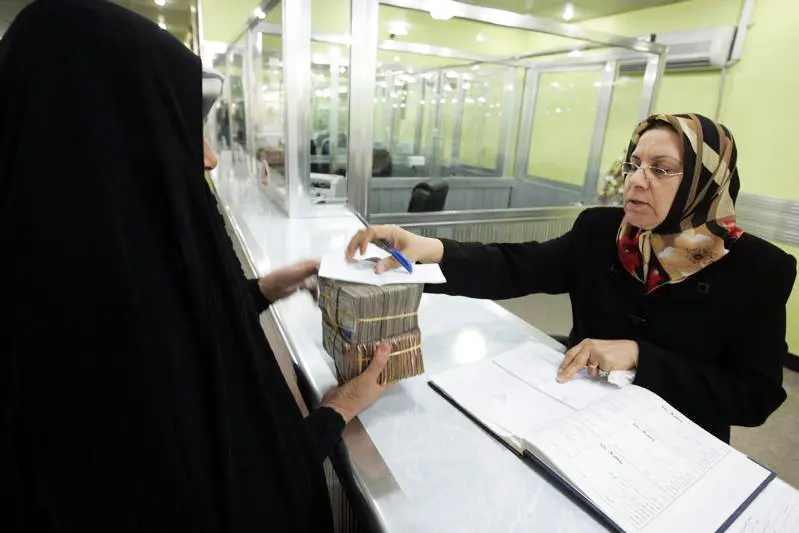PHOTO
06 August 2017
By Neil Unmack
LONDON, Aug 4 (Reuters Breakingviews) - Iraq’s bond market return will not be a cakewalk for investors. Buyers piled into the war-torn country’s first issue of a fixed-income security in a decade. With emerging market debt squeezed by low rates, fund managers have little choice but to take a risk.
Iraq sounds like a sticky investment proposition. Its debt is already more than 60 percent of economic output, and its fiscal deficit was 14 percent of GDP last year. The economy is almost entirely dependent on oil, and an unfinished civil war with Islamic State could cause the country to fragment. Yet investors placed orders for more than six times the $1 billion Iraq was seeking to raise.
There are grounds for optimism. Islamic State is being chased out of its stronghold in Mosul, and the United States is likely to support the country financially as long as it remains a strategic priority. Iraq has the world’s fifth-largest store of oil. Production cuts by the Organization of the Petroleum Exporting Countries have helped the price stabilise around $50 a barrel
These merits do not ensure a smooth ride, though. For one, U.S. support cannot be taken for granted, particularly if the country’s shale boom leads to a change in its Middle East policy. Nor is debt repayment ensured: Ukraine had to restructure its debt in 2015.
Then there’s oil. The International Monetary Fund assumes the price of the black stuff stays at current levels, and that Iraq can cut current and capital spending, reducing debt to 52 percent of GDP by 2022. Yet a weaker oil price would require further spending cuts, and Iraq’s fiscal record is already patchy. The price war started by Saudi Arabia caused Baghdad’s oil export revenue to fall by 40 percent in 2016 from three years earlier.
The lure of Iraq’s bond is the 6.75 percent yield, a fat premium to the near-record low 6.2 percent on offer from other single-B rated emerging market bonds, according to Bank of America Merrill Lynch indices. Investors have poured $45 billion into emerging debt funds this year, according to EPFR, as central banks in developed countries have kept rates low and continued to buy bonds. In such markets issuers have the whip hand over investors.
(The author is a Reuters Breakingviews columnist. The opinions expressed are his own.)
CONTEXT NEWS
- The Republic of Iraq raised its first standalone debt in 10 years on Aug. 2, issuing $1 billion of five-year bonds.
- The securities pay a coupon of 6.75 percent, equivalent to a spread of 493 basis points over US Treasury bonds with a similar maturity.
- SIGN UP FOR BREAKINGVIEWS EMAIL ALERTS http://bit.ly/BVsubscribe
(Editing by Peter Thal Larsen and Bob Cervi)
© Reuters News 2017
By Neil Unmack
LONDON, Aug 4 (Reuters Breakingviews) - Iraq’s bond market return will not be a cakewalk for investors. Buyers piled into the war-torn country’s first issue of a fixed-income security in a decade. With emerging market debt squeezed by low rates, fund managers have little choice but to take a risk.
Iraq sounds like a sticky investment proposition. Its debt is already more than 60 percent of economic output, and its fiscal deficit was 14 percent of GDP last year. The economy is almost entirely dependent on oil, and an unfinished civil war with Islamic State could cause the country to fragment. Yet investors placed orders for more than six times the $1 billion Iraq was seeking to raise.
There are grounds for optimism. Islamic State is being chased out of its stronghold in Mosul, and the United States is likely to support the country financially as long as it remains a strategic priority. Iraq has the world’s fifth-largest store of oil. Production cuts by the Organization of the Petroleum Exporting Countries have helped the price stabilise around $50 a barrel
These merits do not ensure a smooth ride, though. For one, U.S. support cannot be taken for granted, particularly if the country’s shale boom leads to a change in its Middle East policy. Nor is debt repayment ensured: Ukraine had to restructure its debt in 2015.
Then there’s oil. The International Monetary Fund assumes the price of the black stuff stays at current levels, and that Iraq can cut current and capital spending, reducing debt to 52 percent of GDP by 2022. Yet a weaker oil price would require further spending cuts, and Iraq’s fiscal record is already patchy. The price war started by Saudi Arabia caused Baghdad’s oil export revenue to fall by 40 percent in 2016 from three years earlier.
The lure of Iraq’s bond is the 6.75 percent yield, a fat premium to the near-record low 6.2 percent on offer from other single-B rated emerging market bonds, according to Bank of America Merrill Lynch indices. Investors have poured $45 billion into emerging debt funds this year, according to EPFR, as central banks in developed countries have kept rates low and continued to buy bonds. In such markets issuers have the whip hand over investors.
(The author is a Reuters Breakingviews columnist. The opinions expressed are his own.)
CONTEXT NEWS
- The Republic of Iraq raised its first standalone debt in 10 years on Aug. 2, issuing $1 billion of five-year bonds.
- The securities pay a coupon of 6.75 percent, equivalent to a spread of 493 basis points over US Treasury bonds with a similar maturity.
- SIGN UP FOR BREAKINGVIEWS EMAIL ALERTS http://bit.ly/BVsubscribe
(Editing by Peter Thal Larsen and Bob Cervi)
© Reuters News 2017





















